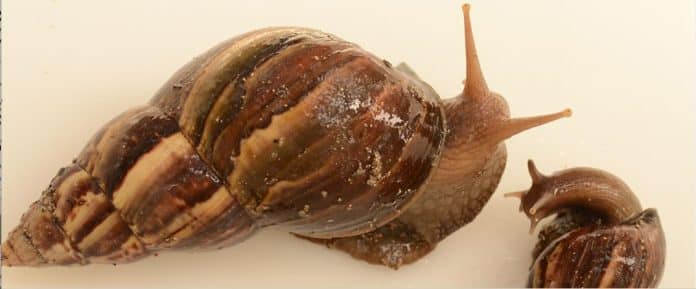by Kirsten Romaguera, UF/IFAS
Two Florida counties were put under quarantine in recent weeks, but this has nothing to do with COVID-19. An agricultural quarantine is intended to prevent the spread of invasive species, but the protocols are unrelated to restrictions put in place for human disease containment. In the most recent cases, the discoveries of the Oriental fruit fly (scientifically known as Bactrocera dorsalis) in Pinellas County and the giant African land snail (GALS) in Pasco County led to quarantines for those counties in late June.
“Understandably, the COVID-19 pandemic has caused some residents to be concerned about the word ‘quarantine’ and what that means in terms of their movement in and out of the quarantined zone,” said Whitney Elmore, UF/IFAS Extension Pasco County director. “For an invasive species quarantine, the movement of people and pets is not prohibited.”
Below, Elmore shares more about what people inside and outside the quarantine zone should know.
Q. Who declares an agricultural quarantine and when is it set?
A. Here in Florida, the Florida Department of Agriculture and Consumer Services (FDACS) and the U.S. Department of Agriculture (USDA) are in charge of positively identifying invasive species and determining quarantine zones. Depending on the invasive potential of the organism, a quarantine may or may not be necessary. In some cases, surveys of the area are completed without a quarantine zone while inspection remains ongoing.
For some species, including GALS, the potential risk of movement and the potential for damage to agricultural, ornamental, structural and human/animal health dictates the necessity for a quarantine zone. The FDACS Division of Plant Industry (DPI) is responsible for the GALS eradication program.
Q. What does it mean when an area is put under quarantine for an invasive species?
A. Plants, plant materials, yard debris, soil and building materials are not allowed in, out or through a quarantine zone. Even plants purchased as gifts cannot be taken into or out of the quarantined zones, even if they are only transported into or out of a home or building and were never placed in the landscape.
Those working in the lawn and waste pickup industry should consult with FDACS about their role in preventing the spread of invasives out of quarantined zones, too. The FDACS DPI has a help line, 1-888-397-1517, for those needing guidance on the quarantine, including questions about identification or eradication methods.
Q. Are approaches any different for invasive animals versus plants?
A. Since most invasive plants are going to be moved more slowly than animals, it is more common for quarantine zones to be set up to prevent spread of invasive animals, which have the ability to spread farther in a shorter period of time. Invasive plants are treated or removed, and the area is monitored for further spread over time. Treatments are typically more effective for eradication of invasive plants compared to animals for the same reason. Known invasive plants and animals are illegal to possess, transport or sell.
Q. How can residents support efforts to eradicate and/or suppress the spread of invasive species?
A. FDACS will communicate with residents, businesses and community government to ensure residents understand their role in the case of a quarantine, should one become necessary. Citizens are the key to quickly identifying potential invasive organisms.
Citizens are urged to contact their local UF/IFAS Extension Office or FDACS when encountering an organism that could be a potentially unknown or even a known invasive. Residents can also become Florida First Detectors by taking online or in-person trainings sessions through UF/IFAS and the First Detector Program. Go to flfirstdetector.com to learn more about the program and get involved.

